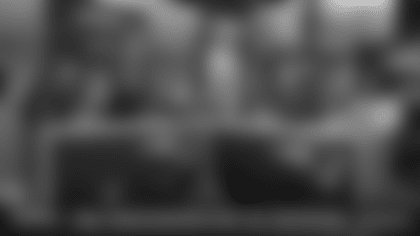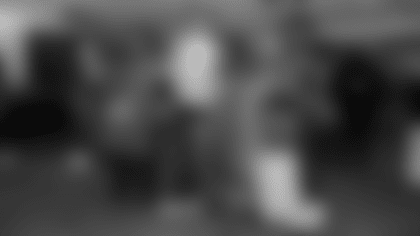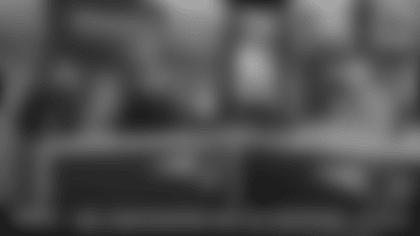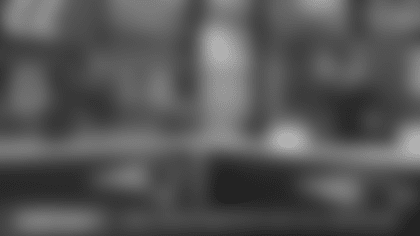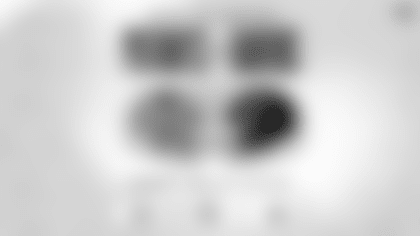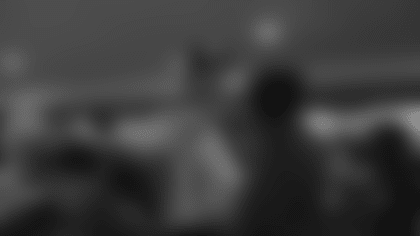Patriots defensive coordinator Dean Pees addresses the media during his conference call on Tuesday, December 08, 2009.
Q: One assumption I can make is that teams will look at what the Dolphins did to you guys from a pass defense standpoint and maybe think that they can have success against your defense. Do you agree with that and how do you prepare your guys for teams opening it up like that the next four games?
DP: I think number one, I can't tell you what other teams will think when they look at... Probably that's all based on whether their personnel or their scheme can dictate that they can do that. You've always got to be able to do what your players can do. Where our problem was was primarily on the pass defense in this last game, that's different than the Saints game where we gave up big plays on some missed assignments, was the fact that we couldn't get off the field on third down. So whether teams attack us that way on third down, I can't tell you what other teams will do. Actually playing the passing game - playing no matter what - in this last game, on first and second down, was probably as much success as we've actually had all year. When we graded the film, first down was fairly successful compared to most games. Second [down] was probably the best second down [game] that we've had all year in 12 games. Our problem in this past game was simply third down; we couldn't get off the field. That's why we had so many plays. That's why they had so many yards. We didn't give up as many plays - didn't give up a lot of big plays. We just couldn't get off the field on third down, for a lot of different reasons, most of which were fundamental mistakes, not necessarily attacking the team this way because we ran this particular coverage, because we really almost never were in the same coverage twice. I don't know that it's going to be that as much as we've just got to do a better job of - we just fundamentally didn't play well on third down, from the front to the back end. We just didn't play well enough and that's my responsibility and I've got to get that fixed.
Q: It seemed like the Dolphins spread you out a lot and it seemed like they ran more three and four receiver sets than they typically do, so how much of that was just them maybe throwing something at you that you hadn't seen from them?
DP: That's not...that three receiver set is something that they had done before. Maybe they did it a little more in this game, but that wasn't something that was any bit of a surprise. In fact, we were very ready for it. Ours was just simply a matter of not executing what we were supposed to execute. If we had double coverage on someone, then we need to double cover them, and we didn't get it done. Whether the guy was supposed to stay underneath on the coverage with help over the top - a couple times that happened, and the guy that was supposed to be underneath got too high on the guy and the guy runs a comeback on him. So you're in a call or you're in a coverage you'd like to be in [and] we just fundamentally didn't play it well enough and we've just got to do a better job of that. It really wasn't so much whether Miami spread us out or not, that really wasn't a surprise. It was just the fact that we just didn't execute sometimes some simple things that we just needed to execute.
Q: Was one of those fundamental issues that fourth-and-six where they ended up catching a 13 yard pass?
DP: Well, there were a bunch of them. I won't pinpoint any one of them, but there were several of them and almost all of them, obviously, were on third downs, basically in the first half. I think they were seven out of eight on third down. In the second half we were a little bit better, but there were just some critical plays in the game, some critical times, and it was the same thing not only in coverage, but it was also fundamentally some things you need to do in the pass rush, whether it's keeping the quarterback in the pocket and not letting him break out and then throw a pass when he's scrambling down field. It wasn't only just coverage; [it was] certain breakdowns in the defense fundamentally - things that we've just got to do a heck of a lot better. It's not really based on what they did. It's really not based on formations. It's really not based so much on the call, it's just here's what - on every call - you've got certain things that, whether it's contain the quarterback or rush the quarterback or play underneath coverage, whatever, and if that's what the call dictates that you do, that's what we need to do. We didn't do the things, just fundamentally, that we needed to do in those situations.
Q: You've obviously been doing this for a few years and I'm sure you've had situations where it's been difficult for guys in the secondary. How do you manage the psyche of young guys like Darius Butler and Jonathan Wilhite and guys that probably had a little bit of a tough weekend? How do you deal with them emotionally, mentally and psyche-wise?
DP: Well, you've just got to coach them. Like you said, I've been doing it for 38 years and I've dealt with a lot of different situations and veteran guys, non-veteran guys, college guys, all different kinds. You've just got to coach them. That's part of being a professional. There's going to be great times, and it's easy to be up and be confident and do all of those things when things are going well, but the sign of a true professional - in any profession - is how you deal with adversity. That's what we've got to talk to these guys about and every guy that you coach, you coach differently. Just like every employee you have in business - you don't probably treat every employee maybe exactly the same. You treat them fairly, but it's not the same. Some people need a kick in the butt to get them going. Other people don't need a kick in the butt; they need a pat on the back. So it's up to us to figure out what that guy needs and to get him to play better. That's my responsibility as a coach; that's our responsibility as defensive coaches - to get these guys playing better fundamentally, 'Don't hang your head, get your head up, let's go, we're still in first place, we need to win some ball games, we need to beat Carolina.' That's really the approach that we'll take this week with all of those guys, and it's, look, we've done this before. You know, four weeks ago everybody was talking about improvement in the secondary and how well they were playing and they were playing with some confidence. Well, obviously it's there and we've just got to bring it out. Two games don't make a season good or bad, but we can't let it keep going.
Q: I think it's fair to say this offseason you guys lost a pretty significant leader at every level of the defense, whether it's Tedy Bruschi, Mike Vrabel, Rodney Harrison, or Richard Seymour. Has it been a process replacing those guys from an off the field, leadership standpoint?
DP: This question was asked to me a few weeks back, and I think any time you lose any leader, you're losing a leader, but somebody else has got to step up and that's what we're looking for guys to do, and I think we've had some guys do that. Do we have enough? I don't know, but the thing about leadership and being a leader is you become a better leader the longer you've been a leader. I don't know if that makes sense, but the difference with Bruschi and Vrabel and all of those guys is yeah, they've been through a lot of good times, and they've been through some down times, so they knew how to kind of pull everything together. Well, when you have new leaders, those guys have to learn, they have a learning process here, too. When everything was going well - great; it's not hard to lead when everything is going well. Well now it's time to be leaders on the team when we've had a couple games where we have not played well on defense. There's no secret about it and we haven't played what we're capable of playing. Somebody's got to take the bull by the horns and step up, and part of that responsibility lies on us as coaches to make sure there's somebody filling that role, and if there's not [a player] quite ready, then we've got to fill that role.
Q: Is it fair to say that there are a lot of guys that lead by example, but as a whole, you need guys to step up and be a little more vocal?
DP: Us guys meaning who?
Q: That you guys need players , guys on the field - whoever it is, whoever the leaders are out there - to maybe step up and be more vocal in these situations?
DP: I don't know that that's necessarily always the case. If you're not a vocal person, you can't all of a sudden become a vocal person. It just doesn't come across that way. It's like there are a lot of different types of coaches out there; there are screamers and yellers and guys that can get away with that, and then there are other guys that aren't. So if you're a coach and all of a sudden you think, 'Well I'm going to become a screamer and a yeller because the head coach is a screamer and a yeller,' it's going to come across phony. That's not you. It's the same way with players. The players are who they are, and some of them are vocal, some of them are not so vocal, some of them lead by example, but a guy that's been quiet the whole time, then all of a sudden to tell that guy, 'Well now you've got to be vocal,' that's not going to be his personality. I think that's a natural thing that happens on teams and the best thing that our guys can do and our leaders can do is for the guys who are vocal to be vocal, and the guys that are leaders by example to set a better example. And we've just got to play better. And we've just got to play better fundamentally, and I think the leadership stuff will take care of itself if we just simply play better. I don't think it is a situation where that's necessarily our biggest problem. Our biggest problem right now is we just did not - basically in this last game - we did not play fundamentally well on third down.
Patriots defensive coordinator Dean Pees addresses the media during his conference call on Tuesday, December 08, 2009.
Q: One assumption I can make is that teams will look at what the Dolphins did to you guys from a pass defense standpoint and maybe think that they can have success against your defense. Do you agree with that and how do you prepare your guys for teams opening it up like that the next four games?
DP: I think number one, I can't tell you what other teams will think when they look at... Probably that's all based on whether their personnel or their scheme can dictate that they can do that. You've always got to be able to do what your players can do. Where our problem was was primarily on the pass defense in this last game, that's different than the Saints game where we gave up big plays on some missed assignments, was the fact that we couldn't get off the field on third down. So whether teams attack us that way on third down, I can't tell you what other teams will do. Actually playing the passing game - playing no matter what - in this last game, on first and second down, was probably as much success as we've actually had all year. When we graded the film, first down was fairly successful compared to most games. Second [down] was probably the best second down [game] that we've had all year in 12 games. Our problem in this past game was simply third down; we couldn't get off the field. That's why we had so many plays. That's why they had so many yards. We didn't give up as many plays - didn't give up a lot of big plays. We just couldn't get off the field on third down, for a lot of different reasons, most of which were fundamental mistakes, not necessarily attacking the team this way because we ran this particular coverage, because we really almost never were in the same coverage twice. I don't know that it's going to be that as much as we've just got to do a better job of - we just fundamentally didn't play well on third down, from the front to the back end. We just didn't play well enough and that's my responsibility and I've got to get that fixed.
Q: It seemed like the Dolphins spread you out a lot and it seemed like they ran more three and four receiver sets than they typically do, so how much of that was just them maybe throwing something at you that you hadn't seen from them?
DP: That's not...that three receiver set is something that they had done before. Maybe they did it a little more in this game, but that wasn't something that was any bit of a surprise. In fact, we were very ready for it. Ours was just simply a matter of not executing what we were supposed to execute. If we had double coverage on someone, then we need to double cover them, and we didn't get it done. Whether the guy was supposed to stay underneath on the coverage with help over the top - a couple times that happened, and the guy that was supposed to be underneath got too high on the guy and the guy runs a comeback on him. So you're in a call or you're in a coverage you'd like to be in [and] we just fundamentally didn't play it well enough and we've just got to do a better job of that. It really wasn't so much whether Miami spread us out or not, that really wasn't a surprise. It was just the fact that we just didn't execute sometimes some simple things that we just needed to execute.
Q: Was one of those fundamental issues that fourth-and-six where they ended up catching a 13 yard pass?
DP: Well, there were a bunch of them. I won't pinpoint any one of them, but there were several of them and almost all of them, obviously, were on third downs, basically in the first half. I think they were seven out of eight on third down. In the second half we were a little bit better, but there were just some critical plays in the game, some critical times, and it was the same thing not only in coverage, but it was also fundamentally some things you need to do in the pass rush, whether it's keeping the quarterback in the pocket and not letting him break out and then throw a pass when he's scrambling down field. It wasn't only just coverage; [it was] certain breakdowns in the defense fundamentally - things that we've just got to do a heck of a lot better. It's not really based on what they did. It's really not based on formations. It's really not based so much on the call, it's just here's what - on every call - you've got certain things that, whether it's contain the quarterback or rush the quarterback or play underneath coverage, whatever, and if that's what the call dictates that you do, that's what we need to do. We didn't do the things, just fundamentally, that we needed to do in those situations.
Q: You've obviously been doing this for a few years and I'm sure you've had situations where it's been difficult for guys in the secondary. How do you manage the psyche of young guys like Darius Butler and Jonathan Wilhite and guys that probably had a little bit of a tough weekend? How do you deal with them emotionally, mentally and psyche-wise?
DP: Well, you've just got to coach them. Like you said, I've been doing it for 38 years and I've dealt with a lot of different situations and veteran guys, non-veteran guys, college guys, all different kinds. You've just got to coach them. That's part of being a professional. There's going to be great times, and it's easy to be up and be confident and do all of those things when things are going well, but the sign of a true professional - in any profession - is how you deal with adversity. That's what we've got to talk to these guys about and every guy that you coach, you coach differently. Just like every employee you have in business - you don't probably treat every employee maybe exactly the same. You treat them fairly, but it's not the same. Some people need a kick in the butt to get them going. Other people don't need a kick in the butt; they need a pat on the back. So it's up to us to figure out what that guy needs and to get him to play better. That's my responsibility as a coach; that's our responsibility as defensive coaches - to get these guys playing better fundamentally, 'Don't hang your head, get your head up, let's go, we're still in first place, we need to win some ball games, we need to beat Carolina.' That's really the approach that we'll take this week with all of those guys, and it's, look, we've done this before. You know, four weeks ago everybody was talking about improvement in the secondary and how well they were playing and they were playing with some confidence. Well, obviously it's there and we've just got to bring it out. Two games don't make a season good or bad, but we can't let it keep going.
Q: I think it's fair to say this offseason you guys lost a pretty significant leader at every level of the defense, whether it's Tedy Bruschi, Mike Vrabel, Rodney Harrison, or Richard Seymour. Has it been a process replacing those guys from an off the field, leadership standpoint?
DP: This question was asked to me a few weeks back, and I think any time you lose any leader, you're losing a leader, but somebody else has got to step up and that's what we're looking for guys to do, and I think we've had some guys do that. Do we have enough? I don't know, but the thing about leadership and being a leader is you become a better leader the longer you've been a leader. I don't know if that makes sense, but the difference with Bruschi and Vrabel and all of those guys is yeah, they've been through a lot of good times, and they've been through some down times, so they knew how to kind of pull everything together. Well, when you have new leaders, those guys have to learn, they have a learning process here, too. When everything was going well - great; it's not hard to lead when everything is going well. Well now it's time to be leaders on the team when we've had a couple games where we have not played well on defense. There's no secret about it and we haven't played what we're capable of playing. Somebody's got to take the bull by the horns and step up, and part of that responsibility lies on us as coaches to make sure there's somebody filling that role, and if there's not [a player] quite ready, then we've got to fill that role.
Q: Is it fair to say that there are a lot of guys that lead by example, but as a whole, you need guys to step up and be a little more vocal?
DP: Us guys meaning who?
Q: That you guys need players , guys on the field - whoever it is, whoever the leaders are out there - to maybe step up and be more vocal in these situations?
DP: I don't know that that's necessarily always the case. If you're not a vocal person, you can't all of a sudden become a vocal person. It just doesn't come across that way. It's like there are a lot of different types of coaches out there; there are screamers and yellers and guys that can get away with that, and then there are other guys that aren't. So if you're a coach and all of a sudden you think, 'Well I'm going to become a screamer and a yeller because the head coach is a screamer and a yeller,' it's going to come across phony. That's not you. It's the same way with players. The players are who they are, and some of them are vocal, some of them are not so vocal, some of them lead by example, but a guy that's been quiet the whole time, then all of a sudden to tell that guy, 'Well now you've got to be vocal,' that's not going to be his personality. I think that's a natural thing that happens on teams and the best thing that our guys can do and our leaders can do is for the guys who are vocal to be vocal, and the guys that are leaders by example to set a better example. And we've just got to play better. And we've just got to play better fundamentally, and I think the leadership stuff will take care of itself if we just simply play better. I don't think it is a situation where that's necessarily our biggest problem. Our biggest problem right now is we just did not - basically in this last game - we did not play fundamentally well on third down.





